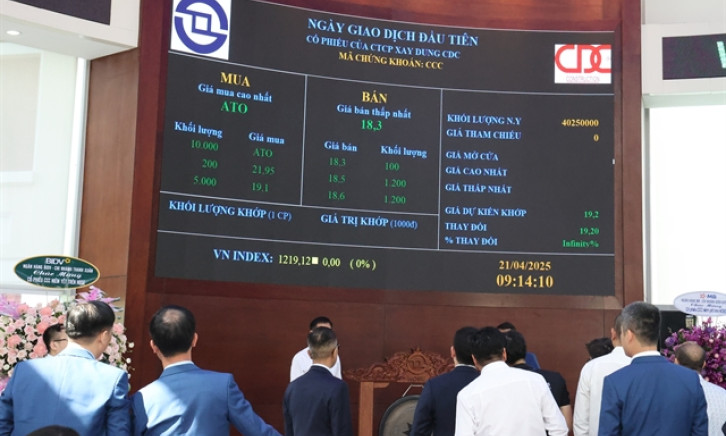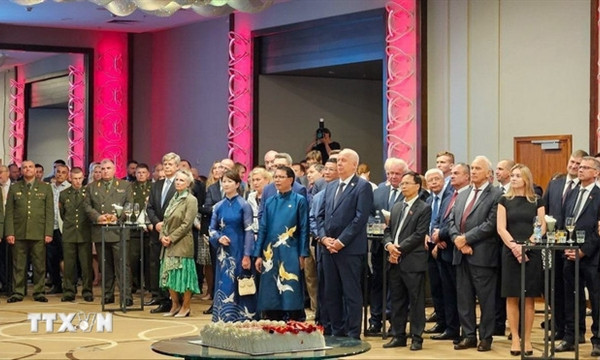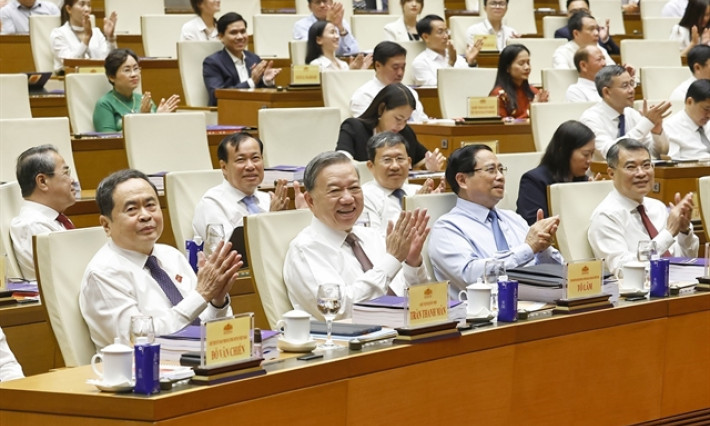Vietnamese PM outlines three key breakthroughs for ASEAN's path to digital excellence
During discussions with ASEAN businesses, Vietnamese Prime Minister Phạm Minh Chính outlined three priority areas and proposed three breakthroughs for ASEAN to lead global digital transformation.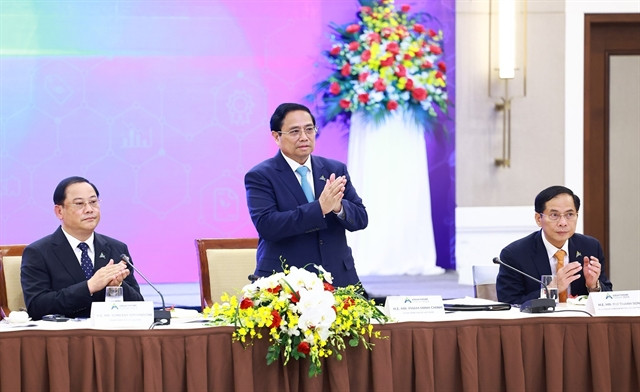
Leaders from ASEAN countries, along with representatives from businesses and partner nations, met on Tuesday for a dynamic discussion on opportunities and challenges within ASEAN's digital economic cooperation.
The roundtable, part of the ASEAN Future Forum 2024, was co-chaired by Vietnamese Prime Minister Phạm Minh Chính and Laotian Prime Minister Sonexay Siphandone, the current ASEAN Chair.
Under the theme "Towards a cohesive, resilient and sustainable ASEAN business community: Seizing opportunities in the digital age", participants engaged in dialogues aimed at fostering closer collaboration among ASEAN members and their partners in digital economic development.
Prime Minister Sonexay Siphandone emphasised the significance of digital transformation, highlighting the need for enhanced cooperation among various stakeholders, including businesses, governments and international partners. As the 2024 ASEAN Chair, he underscored Laos's commitment to promoting e-government initiatives and fostering a conducive policy framework to leverage digital technology for regional competitiveness.
The discussion focused on various aspects, including forming an ASEAN digital economic ecosystem, e-commerce development, semiconductor supply chain enhancement and applying artificial intelligence (AI) in governance. Representatives also addressed the importance of building high-quality digital human resources and improving the investment environment to attract high-tech investments.
At the forum, Scott Beaumont, President of Google Asia-Pacific, underscored ASEAN's status as a dynamic region characterised by integration and connectivity. Google, he noted, takes pride in its role in advancing ASEAN's digital transformation and is committed to closing the digital gap across the region.
In Việt Nam, Beaumont highlighted Google's active involvement in nurturing technological talent, especially in the realm of AI, while simultaneously focusing on developing digital platforms, applications and data resources.
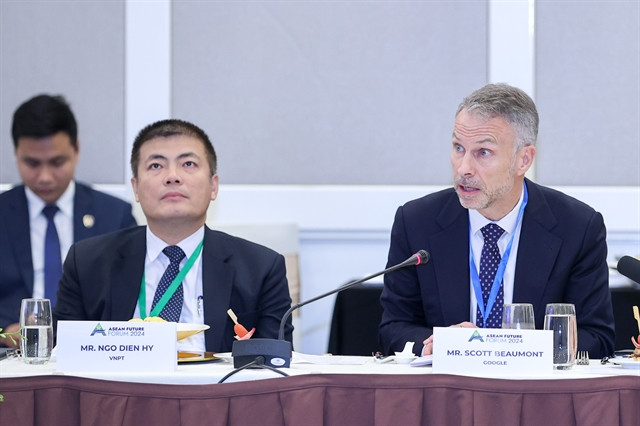
Acknowledging the significant digital economic potential within ASEAN, Beaumont stressed the necessity for strategic investments. This includes bolstering infrastructure, enhancing human capital through training initiatives, prioritising research and development efforts and establishing data centres, particularly at the national level. Moreover, Beaumont emphasised the importance of fostering a robust legal framework to ensure that investors can effectively pursue their objectives within ASEAN's burgeoning digital landscape.
Vietjet Air's CEO, Đinh Việt Phương, highlighted the airline's embrace of AI technologies, citing their deployment to revolutionise aviation operations. He noted Vietjet's investment in cutting-edge technology projects, including the Galaxy Innovation Hub, attracting global businesses.
Phương urged enhanced multilateral cooperation, advocating for shared resources and technology between governments and businesses. He proposed the development of AI-focused incubators and research areas, emphasising the importance of network security and data protection within ASEAN. He called for expanded opportunities for businesses to invest in the ASEAN common market, promoting sustainable development.
Takeo Nakajima, Chief Representative of the Japan Trade External Trade Organisation (JETRO), underlined the need to enhance policy frameworks to attract high-tech investments. He advocated for developing resilient digital infrastructure, supporting high-tech machinery acquisition and collaborating between academia, research and businesses. Nakajima also stressed the importance of copyright protection and fostering large-scale businesses capable of undertaking significant investment projects.
Three priority areas and breakthrough directions
The seminar concluded with Vietnamese Prime Minister Phạm Minh Chính commending constructive input from participants, affirming the imperative of digital transformation for ASEAN's sustainable development.
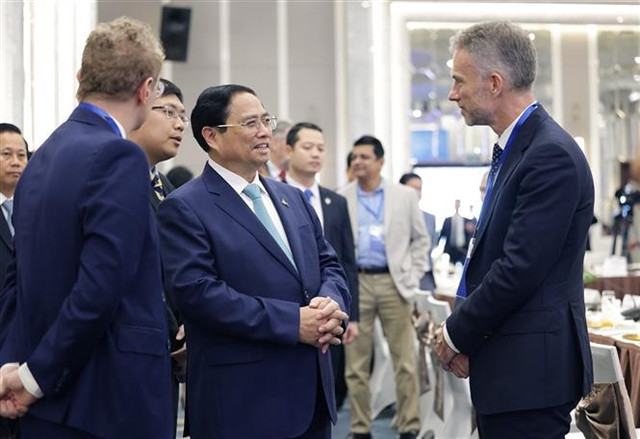
The Vietnamese Prime Minister highlighted several favourable factors propelling ASEAN's digital economic development. These include its strategic geographic and economic positioning, a sizable consumer market, a youthful population demographic, burgeoning middle-class growth, swift economic recovery, extensive economic cooperation networks, and robust growth of the ASEAN digital economic ecosystem.
ASEAN's digital economic revenue is projected to hit US$100 billion in 2023, marking an eight-fold increase from 2016. Experts anticipate this figure to soar beyond $1 trillion by 2030. The completion of the ASEAN Framework Agreement on Digital Economy (DEFA) by the end of 2025 is poised to establish the world's inaugural regional digital economy agreement.
Prime Minister Chính emphasised Việt Nam's push for increased cooperation within the ASEAN business community, investors and partners to advance three digital economic priority areas, including developing the ICT industry, promoting digitalisation in science and technology-linked sectors, and enhancing digital management and data development.
He urged ASEAN members, partners and businesses to collaborate for faster digital transformation, revitalising growth drivers and creating new opportunities. Additionally, support in finance, knowledge sharing and technology transfer is crucial. He also emphasised the importance of setting global standards for digital transformation and enhancing digital governance and security.
He proposed three breakthrough directions to position ASEAN as a global model in digital transformation, emphasising inclusivity, self-reliance and global cooperation. He called for concerted efforts to address common challenges and foster innovation-driven growth across ASEAN industries.




